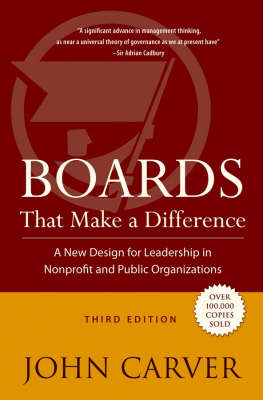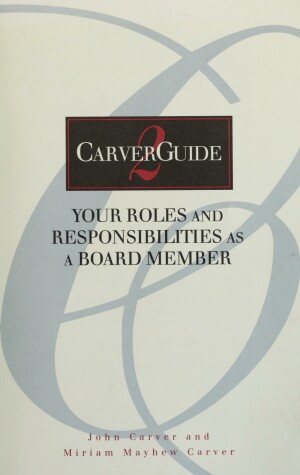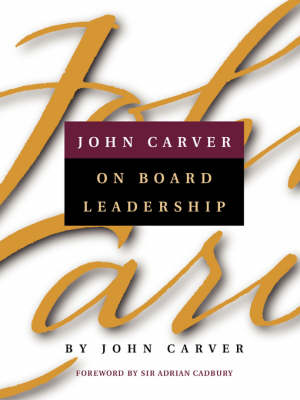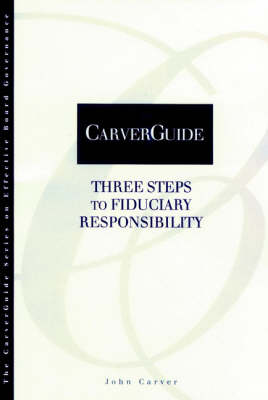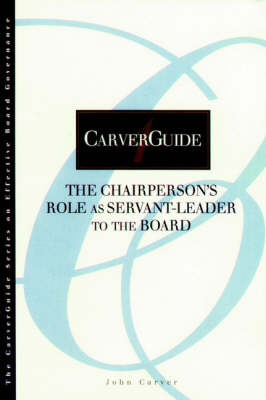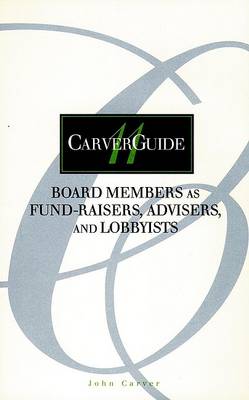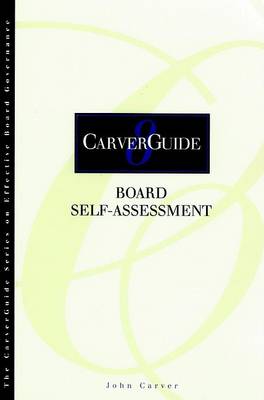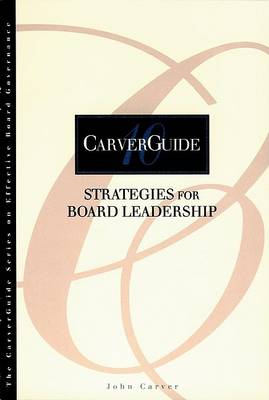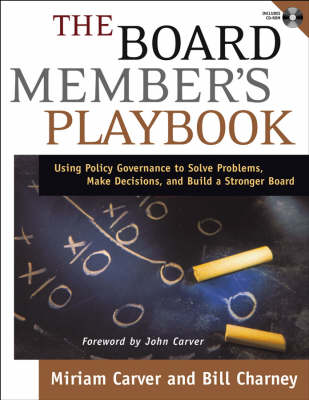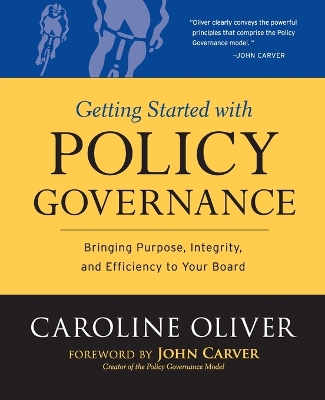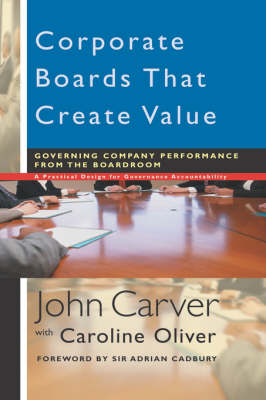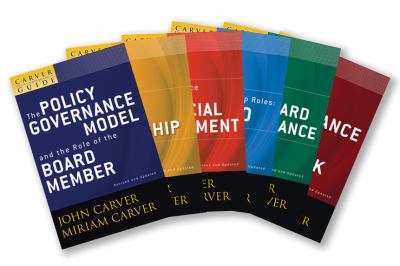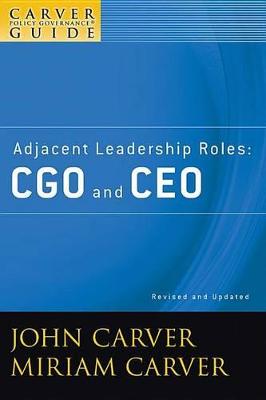J-B Carver Board Governance
20 primary works • 22 total works
Book 3
Book 4
CarverGuide 01: Basic Principles of Policy Governance
by John Carver and Miriam Mayhew Carver
Book 5
Your Roles and Responsibilities as a Board Member
by John Carver and Miriam Carver
Book 7
Book 8
Book 9
Book 10
Book 12
Book 13
Book 14
CarverGuide 09: Making Diversity Meaningful in the Boardroom
by John Carver and Miriam Mayhew Carver
Book 15
Book 17
CarverGuide 12: The CEO Role Under Policy Governance
by John Carver and Miriam Mayhew Carver
Book 18
Step-by-step instructions and sample policies make this a must-have resource for boards in the public and nonprofit sectors aiming to govern their organizations with excellence.
Book 20
Book 24
The Policy Governance Fieldbook
by Caroline Oliver, Mike Conduff, Susan Edsall, Carol Gabanna, Randee Loucks, Denise Paszkiewicz, Catherine Raso, and Linda Stier
--from the Foreword by John Carver
"Local elected officials and professional staff will find Carver'smodel provocative and intriguing. This practical guide is one ofthe best I have encountered. The useful tips at the And of eachchapter are worth the price of the book."
--John Nalbandian, professor of public administration, Universityof Kansas
Boards all around the world have adopted the revolutionary PolicyGovernance principles to improve their leadership and performance.This fieldbook is the latest addition to growing literature on thelandmark model. Endorsed with a foreword by John Carver, thispractical, unflinching resource closely examines eleven diverseorganizations that have implemented Policy Governance in the UnitedStates and Canada. The authors analyze what works--and whatdoesn't--in real world practice. The Policy Governance Fieldbook isfor organizations considering, beginning to use, or already usingCarver's principles. Readers will discover practical advice basedon the real-life experiences of organizations that have tried andtested Policy Governance for themselves.
Each chapter is built around a user-friAndly, hands-onframework--first introducing a specific Policy Governance activityor challenge, exploring the experiences of boards that met thischallenge, and then drawing key lessons from those experiences.Filled with tips and tools for implementation of key principles,the book is far from a theoretical treatise. It is a practicalexploration of real organizations facing real challenges. ThePolicy Governance Fieldbook is an ideal guide for boards that areready to lead their organizations to success.
Book 25
- Decide if Policy Governance is right for them
- Identify and link with owners
- Develop means policies
- Create Ends policies
- Monitor Policies
- Run meetings
- Evaluate
- Plan for the future
Book 26
This book applies John Carver's highly successful Policy Governance model to corporate boards. Carver and boardroom consultant Caroline Oliver explain the world's only conceptually coherent operating system for boards. This simple yet profound system clarifies roles, empowers directors and senior management alike, and makes accountability feasible to a previously unattainable degree. The authors suggest a redefinition and elevation of the value that boards should create and show how to apply the Policy Governance design to commanding company performance. Corporate Boards That Create Value gives corporate directors and all who care about governance a powerful tool for success.
Book 36
Book 37
A Carver Policy Governance Guide, Ends and the Ownership
by John Carver and Miriam Mayhew Carver
The Carver Policy Governance (R) Guide series includes six booklets that offer board members a description of John Carver's Policy Governance model of board leadership. Policy Governance enables a board to fulfill its accountability to its organization's "owners," whether the owners are association members, city residents, company shareholders, or a community of interest. Policy Governance addresses the board's engagement in financial, programmatic, and personnel matters; roles of officers and committees; reporting and evaluation; agendas; and other aspects of the board job.
Ends and the Ownership helps boards distinguish between what an organization is for and what it does (ends versus means) a basic feature of the innovative Policy Governance model. This important guide also discusses the concept of ownership and includes sample policies that can help board members effectively prioritize and govern.
The Policy Governance model is based on the functions rather than the structure of a governing board. It outlines commonsense principles about governing that fit together into an entire system. The practices of the Policy Governance board, which are consistent with the principles, allow it to control without meddling, focus on long-term organizational outputs, powerfully delegate to a CEO and staff, and discharge its fiduciary responsibility in a visionary, strategic manner. Because the model is a total system, the Carver Policy Governance Guide series offers boards a complete set of principles for fulfilling their various obligations.
Book 44
A Carver Policy Governance Guide, Adjacent Leadership Roles
by John Carver and Miriam Mayhew Carver
For boards pursuing, or wanting to pursue, the Policy Governance model, Adjacent Leadership Roles: CGO and CEO examines the leadership roles needed in the boardroom and the executive suite. This guide reveals the two important and separate functions that are key to enabling both governance and management to have the benefit of optimal leadership.
The Policy Governance model is based on the functions rather than the structure of a governing board. It outlines commonsense principles about governing that fit together into an entire system. The practices of the Policy Governance board, which are consistent with the principles, allow it to control without meddling, focus on long-term organizational outputs, powerfully delegate to a CEO and staff, and discharge its fiduciary responsibility in a visionary, strategic manner. Because the model is a total system, the Carver Policy Governance Guide series offers boards a complete set of principles for fulfilling their various obligations.
